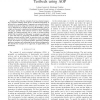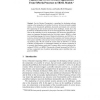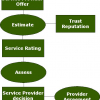140
click to vote
POPL
2012
ACM
13 years 9 months ago
2012
ACM
Since software systems are becoming increasingly more concurrent and distributed, modeling and analysis of interactions among their components is a crucial problem. In several app...
141
click to vote
ER
2011
Springer
14 years 1 months ago
2011
Springer
Service-oriented computing (SOC) increases flexibility of IT systems and helps enterprises to meet their changing needs. Different methods address changing requirements in service...
190
click to vote
ECOWS
2011
Springer
14 years 1 months ago
2011
Springer
Abstract—One of the key concepts of service-oriented computing is dynamic binding which favors on-demand integration of services into a running system. Companies can outsource ta...
120
click to vote
ATAL
2011
Springer
14 years 2 months ago
2011
Springer
We propose that the trust an agent places in another agent declaratively captures an architectural connector between the two agents. We formulate trust as a generic modality expre...
112
click to vote
FMOODS
2006
15 years 3 months ago
2006
Abstract. The usual context of service oriented computing is characterized by several services offering the same functionalities, new services that are continuosly deployed and oth...
129
click to vote
ICWS
2010
IEEE
15 years 3 months ago
2010
IEEE
Several activities in service oriented computing can benefit from the knowledge of properties of a given service composition ahead of time. We will focus here on properties related...
109
click to vote
FASE
2008
Springer
15 years 3 months ago
2008
Springer
Service Oriented Computing is a paradigm for developing software systems as the composition of a number of services. Services are loosely coupled entities, can be dynamically publi...
111
click to vote
WETICE
2005
IEEE
15 years 7 months ago
2005
IEEE
— One of the main challenges in the area of Service Oriented Computing, in general, and of Web services technology, in particular, is the definition of languages and models for ...
108
click to vote
IEEESCC
2007
IEEE
15 years 8 months ago
2007
IEEE
Service discovery has been recognised as an important aspect of service oriented computing. This is even more the case when developing service centric systems in which software sy...
120
click to vote
ICAART
2010
INSTICC
15 years 11 months ago
2010
INSTICC
This article introduces the notion of agreement patterns, which provide a framework for modelling reusable
problem solution descriptions for agreement fulfilment. In particular, t...



